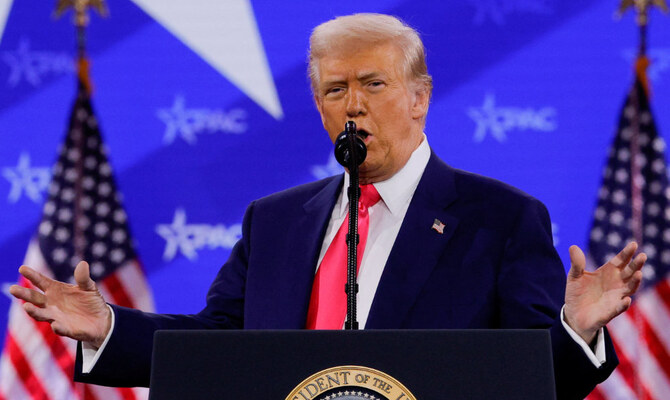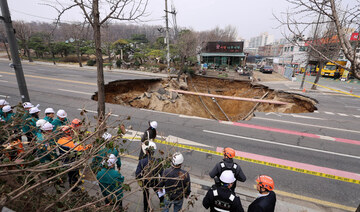NATIONAL HARBOR, United States: US President Donald Trump on Saturday said he was trying to get money back for the billions of dollars sent to support Ukraine’s war against Russia.
His comments came as Washington and Kyiv negotiate a mineral resources deal Trump wants as compensation for the wartime aid his predecessor Joe Biden gave Ukraine.
It was the latest twist in a whirlwind first month since he took office, during which he has upended US foreign policy by making diplomatic overtures toward the Kremlin over the heads of Ukraine and Europe.
Trump told delegates at the Conservative Political Action Conference (CPAC) near Washington: “I’m trying to get the money back, or secured.
“I want them to give us something for all of the money that we put up. We’re asking for rare earth and oil, anything we can get.
“We’re going to get our money back because it’s just not fair. And we will see, but I think we’re pretty close to a deal, and we better be close because that has been a horrible situation.”
Hours earlier, a source told AFP that Ukrainian President Volodymyr Zelensky was “not ready” to sign such a deal, despite growing US pressure.
Trump’s special envoy Keith Kellogg, who met Zelensky earlier this week, said the Ukrainian president understood signing a deal with the US was “critical.”
But the Ukrainian source told AFP that Kyiv needed assurances first.
“In the form in which the draft is now, the president is not ready to accept, we are still trying to make changes and add constructiveness,” the source close to the matter said.
Ukraine wants any agreement signed with the US to include security guarantees as it battles Russia’s nearly three-year invasion.
The negotiations between the two countries come amid a deepening war of words between Trump and Zelensky that has raised alarm in Kyiv and Europe.
On Wednesday, Trump branded his Ukrainian counterpart a “dictator” and called for him to “move fast” to end the war, a day after Russian and US officials held talks in Saudi Arabia without Kyiv.
The US has proposed a United Nations resolution on the Ukraine conflict that omitted any mention of Kyiv’s territory occupied by Russia, diplomatic sources told AFP.
Trump has asked for “$500 billion worth” of rare earth minerals to make up for aid given to Kyiv — a price tag Ukraine has balked at and which is much higher than published US aid figures.
“There are no American obligations in the agreement regarding guarantees or investments, everything about them is very vague, and they want to extract $500 billion from us,” the Ukrainian source told AFP of the proposed deal.
“What kind of partnership is this? And why do we have to give $500 billion, there is no answer,” the source said, adding that Ukraine had proposed amendments to the draft.
The United States has given Ukraine more than $60 billion in military aid since Russia’s invasion, according to official figures — the largest such contribution among Kyiv’s allies but substantially lower than Trump’s figures.
The Kiel Institute, a German economic research body, said that from 2022 until the end of 2024, the United States gave a total of 114.2 billion euros ($119.8 billion) in financial, humanitarian and military aid.
A senior Ukrainian official told AFP Friday that despite the tensions, talks on a possible agreement were “ongoing.” Kellogg praised Zelensky as “courageous” after his visit to Kyiv earlier this week.
The row comes at a critical moment in the conflict. Ukraine marks the third anniversary of Russia’s invasion on Monday and Kyiv’s forces are slowly ceding ground on the frontline.
Moscow’s defense ministry earlier on Saturday claimed the capture of Novolyubivka in the eastern Lugansk region, which is now largely under Russian control.
In a call with Zelensky on Saturday, British Prime Minister Keir Starmer pledged the “UK’s ironclad support for Ukraine.”
Zelensky, in response, praised the United Kingdom for showing “leadership” on the war with Russia.
In London, thousands of people marched in support of Ukraine on Saturday, and polls in the UK suggest strong support for Kyiv.
Trump says US wants return on Ukraine aid money
https://arab.news/578vz
Trump says US wants return on Ukraine aid money

- Trump told delegates at the Conservative Political Action Conference (CPAC) near Washington: “I’m trying to get the money back, or secured
Pakistani Kashmir orders stockpiling of food as India tensions flare

- India blames Pakistan for the attack on civilians at the tourist site of Pahalgam in Indian-administered Kashmir on April 22
- The two nuclear-armed countries have exchanged gunfire for eight consecutive nights along the militarized Line of Control
India blames Pakistan for the attack by gunmen on civilians at the tourist site of Pahalgam in Indian-administered Kashmir on April 22 that killed 26 men. Islamabad has rejected the charge.
The two nuclear-armed countries have exchanged gunfire for eight consecutive nights along the militarized Line of Control, the de facto border, according to the Indian army, and the uneasy neighbors have issued a raft of tit-for-tat punitive diplomatic measures.
“Instructions have been issued to stock food supplies for two months in the 13 constituencies along the Line of Control (LoC),” the prime minister of Pakistan-administered Kashmir, Chaudhry Anwar ul Haq, told the local assembly on Friday.
The regional government has also created an emergency fund of one billion rupees ($3.5 million) to ensure the supply of “food, medicines and all other basic necessities” to the 13 constituencies, he said.
Government and privately owned machinery was also being deployed to maintain roads in the areas along the LoC, he said.
The attack in Indian Kashmir and subsequent tensions, including expulsions and closed border crossings, have raised fears of a conflagration between India and Pakistan.
Indian Prime Minister Narendra Modi on Tuesday gave the military “complete operational freedom” to respond to the attack.
Pakistan has denied any involvement and has said it has “credible evidence” that India is planning an imminent military strike, vowing that any attack would be met with a response.
Fearing a military escalation, authorities in Pakistani Kashmir shut more than 1,000 religious schools for 10 days on Thursday.
India and Pakistan, which both claim Kashmir in full, have fought over the Himalayan territory since the end of British rule in 1947.
10 killed in Philippines when passenger bus slams into vehicles at a toll booth

- More than two dozen others were injured in the multiple-vehicle collision in Tarlac city, north of Manila
- The bus driver was taken into custody and initially told investigators that he dozed off shortly before the crash
MANILA: A speeding passenger bus slammed into a row of vehicles lined up at a highway toll booth Thursday in the northern Philippines, killing 10 people, including children, police said.
More than two dozen others were injured in the multiple-vehicle collision in Tarlac city, north of Manila, at a heavy travel time on May Day holiday, police said.
The bus driver, who was among the injured, was taken into custody and initially told investigators that he dozed off shortly before the crash, Tarlac police chief Lt. Col. Romel Santos told reporters.
The bus crashed into a van, which was lined up with three other vehicles at the toll booth. Eight of the dead, including children, were in the van, which was pinned between the wayward bus from behind and another car in front, police said.
A couple died in a car in the collisions that happened around midday in the scorching summer heat, police said, adding that many of the injured were bus passengers.
Vehicular accidents are common in the Philippines because of poor enforcement of safety and traffic regulations, faulty vehicles and reckless driving.
UK court to rule on Prince Harry security appeal

- Prince Harry says security concerns have hampered his ability to visit the UK and bring his family with him
- Harry’s fraught ties with his family have worsened after various public allegations he and Meghan made against the royals
LONDON: Prince Harry will learn Friday whether his bid to restore his UK police protection has been upheld, in an appeals court verdict that could determine how often the estranged royal visits Britain.
King Charles III’s youngest son has been embroiled in the years-long legal saga – one of many – since the UK government downgraded his security when he stepped down from royal life and left to live abroad with his wife, Meghan.
Since moving to California in 2020, Harry and Meghan have had a second child, Lilibet, a sister to Archie born in 2019, and rarely engage with the British royals.
But the prince says security concerns have hampered his ability to visit the UK and bring his family with him.
The government committee which handles protection for royals and public figures in 2020 decided he would not receive the “same degree” of publicly funded protection when in Britain.
After initially losing a case in the High Court challenging the decision last year, the Duke of Sussex, as he is formally known, was allowed to launch an appeal against the interior ministry.
His lawyers argue Harry was “singled out” for “unjustified and inferior treatment,” and that the committee did not fully assess the security threats when downgrading his protection.
Harry, whose older brother is heir-to-the-throne Prince William, has long been haunted by the 1997 death of his mother Princess Diana in a high-speed car crash as she tried to escape paparazzi photographers.
The prince has blamed the press for the tragedy, and cited intense media scrutiny as one of the reasons he and Meghan took a step back five years ago.
In the two-day appeal hearing last month, Harry’s lawyers said the Sussexes had been threatened by Al-Qaeda and involved in a “dangerous car pursuit with paparazzi” in New York City, as an example of the security dangers he faces.
“There is a person sitting behind me whose safety, whose security and whose life is at stake,” the prince’s lawyer Shaheed Fatima said in concluding statements.
In a 2023 High Court hearing, Harry, a former British army captain who served in Afghanistan, said it was too dangerous to bring his family to the UK without bolstered security.
“The UK is my home,” he said. “The UK is central to the heritage of my children. That cannot happen if it’s not possible to keep them safe.”
However, the High Court concluded that the government had acted lawfully in its decision.
In the appeal hearing, government lawyers said Harry’s security was meant to be “bespoke” to his “revised circumstances,” adding it was a result of his decision to spend less time in the UK.
Harry’s fraught ties with his family have worsened after various public allegations he and Meghan made against the royals.
Harry and his brother William are barely on speaking terms, according to UK media.
He has also hardly seen his father King Charles – who has been receiving treatment for an unspecified type of cancer – for over a year.
While Harry has maintained a relatively low-profile since 2020, Meghan has been boosting her online presence this year, having already launched a podcast and Netflix series as well as making a return to social media.
Truck driver’s body recovered from huge Japan sinkhole after three months

- A road in the city of Yashio caved in during morning rush hour in late January while the man was driving his lorry on it
- The sinkhole, which was caused by corroded sewerage pipes, was reportedly 16 meters deep in February
TOKYO: Japanese rescuers have recovered the body of a truck driver who was swallowed by a huge sinkhole near Tokyo three months ago, an official said on Friday.
A road in the city of Yashio caved in during morning rush hour in late January while the 74-year-old man was driving his lorry on it.
The sinkhole, which was caused by corroded sewerage pipes, was reportedly 16 meters (52 feet) deep in February.
The search operation was hindered by unstable ground, which raised the risk of the chasm collapsing further and prevented rescuers from approaching the area where the driver was believed to be buried.
Since then the hole has grown to at least 40 meters across, almost the length of an Olympic swimming pool.
A slope later allowed rescuers to send heavy equipment into the hole while 1.2 million residents were asked to temporarily cut back on showers and laundry to prevent leaking sewage from hindering the operation.
Walls were built to ensure safety, regional officials said.
“We discovered a man inside the truck cabin and confirmed his death, then passed the incident to police,” a spokesman for the local fire department said Friday.
A police spokesman said investigations were under way, including officially confirming the body’s identity.
“Until the very end of his life, my father, who had a strong heart, must have been hoping to come home alive – fighting fear and pain – which makes me feel a tightening in my heart,” a family member of the unnamed driver said in a statement to Japanese media.
“I can’t believe or accept the fact that my father, who was loved by everyone, suddenly disappeared,” the statement said.
The number of sinkholes in Japan is rising, topping 10,000 in fiscal 2022. Many of these are sewerage-related in urban areas, a land ministry probe shows.
In 2016 a giant sinkhole around 30 meters wide and 15 meters deep appeared on a busy street in Fukuoka city, triggered by nearby subway construction.
No one was hurt and the street reopened a week after workers toiled around the clock.
China says evaluating US offer of tariff talks but wants ‘sincerity’

- China demands that the US “correct its wrong practices and cancel unilateral tariffs”
- Attempting coercion and blackmail under the guise of talks will not work, says commerce ministry
BEIJING: China said Friday it is evaluating a US offer for negotiations on tariffs but wanted Washington to show “sincerity” and be ready to scrap levies that have roiled global markets and supply chains.
Punishing US tariffs that have reached 145 percent on many Chinese products came into force in April while Beijing has responded with fresh 125 percent duties on imports from the United States.
High-end tech goods such as smartphones, semiconductors and computers have received a temporary reprieve from US tariffs.
US President Donald Trump has repeatedly claimed that China has reached out for talks on the tariffs, and this week said he believed there was a “very good chance we’re going to make a deal.”
Beijing’s commerce ministry on Friday confirmed the US had reached out and that it was “currently evaluating” the offer.
But, it said, any talks would first require sincerity from the US side.
“If the US wants to talk, it should show its sincerity to do so, be prepared to correct its wrong practices and cancel unilateral tariffs,” the ministry said.
“In any possible dialogue or talks, if the US side does not correct its wrong unilateral tariff measures, it just means the US side is completely insincere and will further damage the mutual trust between the two sides,” it added.
“Saying one thing and doing another, or even attempting coercion and blackmail under the guise of talks will not work,” the commerce ministry said.
Dozens of countries face a 90-day deadline expiring in July to strike an agreement with Washington and avoid higher, country-specific rates.
But Beijing had vowed to fight a trade war to the bitter end if needed, with a video posted on social media this week by its foreign ministry vowing to “never kneel down!“
But it has acknowledged global economic vicissitudes have strained its economy, long dependent on exports, with officials admitting that foreign-facing firms are facing difficulties.
Data this week showed factory activity shrank in April, with Beijing blaming a “sharp shift” in the global economy.
Chinese exports soared more than 12 percent in March as businesses rushed to get ahead of the swingeing tariffs.



















